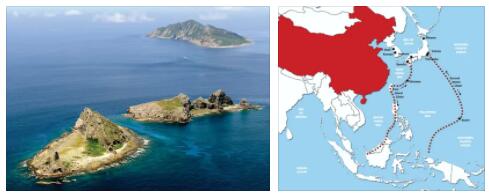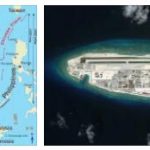Why are there so many acute conflicts over the demarcation of sea areas in Asia right now? In European eyes, some of them appear almost incomprehensible, and the drama around them evokes wonder. The warring parties seem to lack the ability to quell the conflicts – not to mention finding solutions to them. In addition, peace brokers shine with their absence.
- What is being argued about in sea areas in Asia?
- How far back in history does the conflict go?
- Why is it controversial right now?
- How can conflicts be resolved?
2: Historical rivalry
The starting point for many of the conflicts is historical contradictions that lead to disputes over sovereignty over archipelagos at sea and land borders. When Japan and China fight for ownership of the Senkaku / Diaoyu archipelago in the East China Sea, the parties base their claims on dramatically different understandings of history . China claims that their rights can be traced back to the 14th century Ming Dynasty (historical rights). Japan emphasizes that the country has had dominion over the archipelago since the war victory over China in 1895, only interrupted by US occupation after World War II.
In addition, the Japanese emphasize that the archipelago was deserted in 1895 (terra nullius). In international law, there is no generally accepted evidence for how far back in history a party can go to legitimize a territorial claim. What dramatic consequences would it not have if sovereignty and borders were to change from the worldview a hundred years ago? China and India have also been at loggerheads for years over the demarcation between the two countries; they have even fought a war as a result. Different interpretations of history play an important role reinforced by the “random” demarcations of the former colonial power.
In Asia – unlike in Europe – the lines of conflict from World War II are not just history, but a living political reality . According to China and South Korea, Japan has not unreservedly apologized for the abuses during the Japanese occupation of Korea from 1910 to 1945 and China from 1937 to 1945. This is an important historical backdrop for the fighting in the East China Sea between Japan and China and between the South. -Korea and Japan on the Dokdo / Takeshima archipelago (Chinese / Japanese name).
Attacks on Japan’s lack of settlement with its past resonate with the peoples of China and South Korea. The horrific experiences during the occupation are still deeply remembered by the people.
At the same time, strong nationalist forces in Japan are making the situation even worse by denying documented Japanese war crimes. In addition, in the near future there will be presidential elections in South Korea and parliamentary elections in Japan, respectively, and China will have new leadership in November. None of the current leaders in the three countries dare to take the chance of appearing “weak” or lenient in allegedly important issues for national sovereignty. Then it is safer to appeal to nationalism and historical hatred of Japan.
Moreover, in China, the Communist Party no longer has a credible ideology to play on. It uses nationalism as a kind of substitute and alternative way to gain support. But sometimes nationalism can take over. It happened recently when Chinese protesters attacked Japanese politics and property during the island war. This resulted in the Chinese authorities losing control of the protests even though it was the same leaders who had inspired and partially organized the demonstrations.
The Chinese government thus benefits from the fact that social and political contradictions within China are ” derailed ” through protests against people from outside – but not too strongly or too violently! In Asia, the consideration of prestige and the fear of “losing face” also play a significantly greater role in politics than in our part of the world.
3: The law of the sea lacks an answer
The UN Convention on the Law of the Sea could be a good starting point for resolving the conflicts in the East China and South China Seas. All the countries in the area have in fact joined the agreement. But in the large myriad of small islands, cliffs and reefs in these sea areas, it is not easy to apply the principles of the Law of the Sea Treaty. Only the question of which of the uninhabited small islands has “requirements” for a separate continental shelf and economic zone will be disputed. The Convention on the Law of the Sea does not give such rights to uninhabited cliffs that cannot support human settlement and economic activity.
Japan claims that the archipelago has the right to an economic zone and its own shelf. China has not officially taken a stand on this. Agreeing on baselines as a basis for shelf division and boundaries for economic zones then becomes extremely complicated. So how should these principles be weighed against “historical” rights that China in particular attaches great importance to? In today’s heated climate, it is also not easy to envisage temporary agreements pending long-term solutions.
4: Negotiations in lock
Many years ago, according to programingplease.com, China and Japan agreed to put sovereignty issues in the East China Sea on ice and instead negotiate joint resource utilization . And the promising prospects for finding oil and gas in the area occupy both countries, which are the world’s second and third largest importers of crude oil, respectively. After numerous fruitless meetings, the parties are equally far apart and without being able to agree on which territories are to be included. Nor could the agreement in principle prevent the acute conflict that arose over the Senkaku / Diaoyu archipelago after the Japanese state bought three of the islands from a private owner who had owned them since the 1970s.
With the acquisition, the Japanese Prime Minister Yoshihiko Noda actually tried to get ahead of the nationalist governor of Tokyo, Shintaro Ishihara. Ishihara had in fact started a private fundraiser to buy the islands of Tokyo city. The plan was to build facilities there to more strongly mark Japanese domination in the conflict with China.
But instead of looking at the Japanese government’s intervention as a conflict mitigation measure, Chinese leaders chose to interpret the acquisition as a dramatic change in the current legal situation. From the outside, it is difficult to understand that Beijing could have benefited more from the implementation of Governor Ishihara’s plans. The sale would have taken place anyway.








